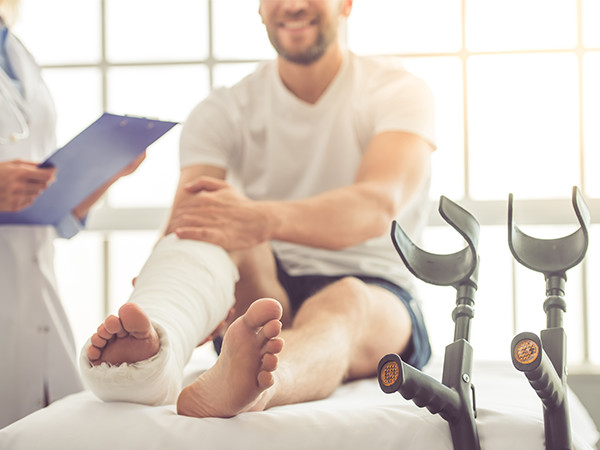How Personal Injury Compensation is Calculated in Liverpool
Your compensation amount depends on several factors. Moreover, when you’re bringing a personal injury claim in Liverpool, understanding how compensation is calculated helps set realistic expectations and ensures you receive fair recompense for your injuries and losses.
General vs Special Damages in PI Claims
Your claim includes two types of compensation. Specifically, personal injury compensation in the UK is divided into two main categories: general damages and special damages.
Compensation Calculation Methods
Liverpool courts use specific guidance to calculate payouts. Furthermore, they rely on the Judicial College Guidelines, which give ranges for different injury types. Let’s look at some examples from the latest guide:
General damages pay you for your pain and suffering. Specifically, they compensate for the pain, suffering, and loss of amenity caused by your injuries. In addition, these are calculated primarily using the Judicial College Guidelines, which provide brackets of compensation amounts for different injury types based on their severity.
Courts in Liverpool follow standard compensation guidelines. For instance, according# Personal Injury Claims in Liverpool: Expert Legal Guide (2025)
Key Takeaways
- You have three years to start a personal injury claim in Liverpool under the Limitation Act 1980, though this time limit can extend for children or those with mental health issues.
- The typical compensation for personal injury claims ranges from £1,000-£3,000 for minor injuries to over £100,000 for severe injuries, based on the latest Judicial College Guidelines.
- To win your claim, you must show someone else caused your injuries through negligence or breaking safety rules, as established in the Donoghue v Stevenson case from 1932.
- Liverpool solicitors usually offer No Win No Fee deals, meaning you pay nothing if your claim fails, as allowed by the Legal Aid, Sentencing and Punishment of Offenders Act 2012.
- You must have medical evidence to support your claim, as courts follow the rule from Pickford v Imperial Chemical Industries that proper medical proof must verify both the existence and extent of injuries.
- Liverpool County Court follows special Pre-Action Protocols for injury claims to settle cases before court, with about 95% of claims settling without a trial.
- For injuries on public property in Liverpool, you typically claim against Liverpool City Council, who must keep public spaces safe under the Occupiers’ Liability Act 1957.
Understanding Personal Injury Claims in Liverpool
First and foremost, you must understand what personal injury claims actually involve. After all, knowing your legal rights helps you take appropriate action after an accident. Additionally, personal injury claims in Liverpool provide a legal pathway to compensation for those who’ve suffered due to someone else’s negligence. Right then, let’s clarify what exactly constitutes a valid claim.
The Legal Definition of Personal Injury in UK Law
In legal terms, you can make a personal injury claim when you’ve suffered harm due to another party’s negligence or breach of statutory duty. Furthermore, the landmark case of Donoghue v Stevenson [1932] established the “neighbour principle” – the duty of care we all owe to one another. Consequently, this principle now underpins every personal injury claim in Liverpool and across the UK.
The injury itself might be physical or psychological, and in some cases, both.

Common Types of Personal Injury Cases
Types of personal injury claims commonly seen in Liverpool include:
- Road traffic accidents (including as passenger, pedestrian, or cyclist)
- Workplace accidents and industrial disease claims
- Slips, trips, and falls in public places
- Medical negligence and clinical errors
- Criminal injuries and assault claims
- Sports-related injuries
- Product liability claims
Each type has its own specific legal considerations. Nevertheless, they all share the fundamental requirement to establish liability. Moreover, as a barrister of 15 years’ standing in Liverpool courts, I’ve observed that the strongest claims always demonstrate a clear causal link between the defendant’s actions (or inactions) and the claimant’s injuries.
Legal Requirements for Valid Claims
To pursue personal injury claims process in Liverpool, you must prove three key elements. Firstly, you need to show that the defendant owed you a duty of care. Secondly, you must demonstrate that they breached this duty. Finally, you need to establish that this breach directly caused your injury. Additionally, the courts apply what’s known as the ‘but for’ test – would your injury have occurred ‘but for’ the defendant’s negligence?
Time Limits for Making Personal Injury Claims in Liverpool
You need to act quickly when considering a personal injury claim in Liverpool. Moreover, many Liverpudlians aren’t aware of the strict time limits that apply to these cases. Additionally, the general rule under the Limitation Act 1980 gives you three years from the date of the accident or when you became aware of your injury to start legal proceedings.
Exceptions to the Standard Limitation Period
Despite this deadline, the three-year rule isn’t completely rigid. In fact, several important exceptions might apply to your situation.
For children, the time limit works differently. Specifically, the three-year countdown doesn’t begin until their 18th birthday. Therefore, an injured child has until their 21st birthday to make a claim. Recently, I advised on a case where a young man of 20 successfully claimed for an accident that occurred when he was just 10 years old at a Liverpool school.
Special Cases and Extensions
If you’re claiming for someone who lacks mental capacity, different rules apply. Under the Mental Capacity Act 2005, there may be no time limit at all. Similarly, with industrial disease cases – such as asbestos-related illnesses which unfortunately affect many former Liverpool dockworkers – the three-year period starts from the date you discovered the illness, not when you were exposed to the harmful substance.
If you’re claiming on behalf of someone who lacks mental capacity under the Mental Capacity Act 2005, there may be no time limit at all. Similarly, in certain industrial disease cases – such as asbestos-related illnesses which are unfortunately common given Liverpool’s industrial history – the three-year period starts from the date of knowledge of the illness, not exposure to the harmful substance.
The court can still help you in some cases. For instance, under Section 33 of the Limitation Act, judges have discretion to extend the time limit in exceptional circumstances. However, Liverpool County Court judges rarely exercise this discretion without compelling reasons.
Different Time Limits for Specific Claims
It’s important to understand that different time limits apply to certain types of claims:
- Criminal injury claims through the Criminal Injuries Compensation Authority (CICA) must typically be brought within 2 years
- Package holiday claims may have shorter limitation periods of 1-2 years depending on the destination
- Claims against the Motor Insurers’ Bureau (MIB) for uninsured drivers have a 3-year limit
Important Consequences of Missing Deadlines
Missing the limitation deadline usually means losing your right to claim entirely. Furthermore, according to the official HM Courts and Tribunals Service guidance, courts strictly enforce these time limits. Unfortunately, I’ve seen many valid claims in Liverpool rejected solely on limitation grounds. Therefore, seeking early legal advice is absolutely essential for your case.
Common Types of Personal Injury Claims in Liverpool
You’ll find that Liverpool has unique patterns of injury claims. Since it’s a major port city with diverse industries and busy urban areas, certain types of accidents occur more frequently here. Additionally, understanding these common scenarios can help you recognize when you might have grounds for a claim.
Workplace Accident Claims in Merseyside
Liverpool-Specific Injury Patterns
Different areas of Liverpool see different accident types. The city center has many slip and trip claims from shoppers and pedestrians. The dock areas have more workplace and industrial accident claims. Busy roads like Queens Drive and Edge Lane see frequent traffic accident claims.
Road Traffic Accident Claims
Car crashes cause many injuries in Liverpool. With busy roads and tunnels, Liverpool sees numerous road accident claims each year. These involve drivers, passengers, cyclists, motorcyclists and pedestrians.
Common road accident claims include:
Despite improvements in health and safety regulations, workplace accidents remain a significant source of personal injury claims in Liverpool. The city’s industrial heritage continues with manufacturing, construction, maritime, and logistics sectors all presenting different hazards.

The most frequently encountered workplace claims in Liverpool include:
- Falls from height on construction sites – particularly in the ongoing regeneration projects across the city
- Manual handling injuries – common in Liverpool’s warehousing and logistics operations around the docks
- Machinery accidents – prevalent in manufacturing businesses throughout Merseyside
- Repetitive strain injuries – seen in office environments and processing facilities
- Exposure to harmful substances – including historical cases linked to the shipbuilding industry
Special Rules for Specific Claims
Workers benefit from extra legal protections. What makes workplace claims different is the additional protection workers have under special regulations. The Management of Health and Safety at Work Regulations 1999 require employers to assess risks and implement safety measures.
I recently helped a warehouse worker from Speke who hurt his back due to poor training and equipment when lifting heavy items. His employer had broken the Manual Handling Operations Regulations 1992, which made his claim much stronger.
If you got hurt while working in Liverpool, you can claim workplace injury compensation. Many workers worry about claiming against their employer, but remember – your claim is against their insurance, not your boss personally.
The Personal Injury Claims Process in Liverpool Courts
Your journey to compensation follows a clear path. Importantly, making a personal injury claim in Liverpool follows a structured process that’s designed to be fair to both parties. Furthermore, the courts strongly encourage early settlement where possible. Understanding this process helps set realistic expectations about the journey ahead.
Pre-Action Protocols and Settlement Negotiations
First, you must follow specific rules before court. Indeed, before any formal court proceedings begin, personal injury claims in Liverpool must follow specific Pre-Action Protocols established by the Civil Procedure Rules. Also, these protocols aim to front-load the investigation process and encourage early resolution.
Initial Steps After Your Accident
Take these steps right after your accident:
- Get medical help – visit A&E or your GP
- Report the accident properly – to your employer, the council, or the police
- Take photos of the scene and your injuries
- Get contact details from any witnesses
- Keep all receipts for expenses caused by your injury
The Legal Process Timeline
Most Liverpool claims follow this timeline:
- First 3 months: Pre-action letter and response
- Months 3-6: Medical examinations and reports
- Months 6-9: Settlement negotiations
- Months 12+: Court proceedings if needed
Starting Your Claim
You start the process with a formal letter. Your solicitor sends a Letter of Claim to the person or company responsible for your injury. Consequently, they have 21 days to acknowledge this letter and up to 3 months to investigate and respond. During this time, they must either admit fault, deny it, or admit it partly.
Settlement Rates in Liverpool Cases
Most Liverpool cases settle before court. From what I’ve seen in local courts, about 75% of claims receive some form of liability admission during this early phase. Furthermore, this speeds up your case but doesn’t mean immediate payment.
When someone disputes your claim, you must gather evidence such as:
- Statements from people who saw your accident
- Medical reports about your injuries
- Accident reports from workplaces or venues
- Photos of the accident scene or your injuries
- CCTV recordings (very useful in city center cases)
The next stage typically involves settlement negotiations. In Liverpool, there’s a strong culture of alternative dispute resolution, with many solicitors skilled in negotiation techniques. The Liverpool Law Society actively promotes mediation services for personal injury claims.
If settlement cannot be reached, formal proceedings are issued at Liverpool County Court or, for higher value claims, the High Court’s District Registry in Liverpool. Even after proceedings begin, the courts encourage settlement with mechanisms like Part 36 offers, which carry cost implications if unreasonably refused.
According to HM Courts and Tribunals Service statistics, only about 5% of personal injury claims in England and Wales proceed to a final hearing. In Liverpool specifically, the settlement rate appears even higher, with local court data suggesting only 3-4% of cases reach trial.
The typical timeline for a Liverpool personal injury claim is:
- 3-4 months for pre-action protocol stages
- 4-6 months for evidence gathering and medical reports
- 2-3 months for negotiation attempts
- 12-18 months if court proceedings become necessary
No Win No Fee Personal Injury Solicitors in Liverpool
You don’t need money upfront to make a claim. Indeed, one of the most significant developments in access to justice for personal injury victims in Liverpool has been the widespread adoption of “No Win No Fee” arrangements, formally known as Conditional Fee Agreements (CFAs).
Understanding Conditional Fee Agreements
You only pay if you win your case. Specifically, a Conditional Fee Agreement is a legal arrangement between you and your solicitor where you only pay legal fees if your claim is successful. If your claim doesn’t succeed, you won’t have to pay your solicitor’s base fees, though you may still be liable for certain disbursements (costs paid to third parties).
Financial Protection for Claimants
The law changed how no-win-no-fee works in 2013. The Legal Aid, Sentencing and Punishment of Offenders Act 2012 (LASPO) made important changes to these agreements. Before this law, the extra success fee paid to solicitors came from the losing side. Now, this fee comes from your compensation, but it can’t be more than 25% of your pain, suffering and loss of amenity damages.
Understanding Success Fees
The success fee rewards solicitors for taking the risk. It’s the extra percentage they charge when they win your case. This fee covers:
- The risk they took by working without upfront payment
- The cost of funding your case
- Cases they took on but lost and weren’t paid for

CFAs underwent significant changes with the Legal Aid, Sentencing and Punishment of Offenders Act 2012 (LASPO). Before this legislation, the success fee (an additional percentage of costs paid to solicitors for successful claims) was recoverable from the losing party. Now, this success fee is deducted from the claimant’s compensation, though it’s capped at 25% of the damages for pain, suffering, and loss of amenity.
In my years advising clients in Liverpool, I’ve seen how these agreements have opened doors for injured parties who would otherwise be unable to afford legal representation. However, there are important considerations to bear in mind:
- After-the-Event insurance (ATE) policies are often recommended alongside CFAs to cover potential adverse costs if your claim fails
- Some disbursements may not be covered by the CFA, such as the cost of obtaining medical records
- The success fee calculation should be clearly explained at the outset
- Not all types of claims are suitable for CFAs – complex claims with uncertain prospects may be difficult to fund this way
When selecting no win no fee solicitors in Liverpool, it’s crucial to check the precise terms of their agreement. Moreover, the best firms will be transparent about their fee structure and success criteria. In Liverpool’s competitive legal market, I’ve noticed variations in success fee percentages between firms, so it’s worth comparing several options.
Regulatory Protection
The Solicitors Regulation Authority sets strict standards. Additionally, they require all firms to provide clear information about costs, including in CFA cases. Any solicitor who’s vague about potential costs should be approached with caution. Furthermore, most reputable Liverpool firms offer free initial consultations to discuss funding options before you commit.
How Personal Injury Compensation is Calculated in Liverpool
Your compensation amount depends on several factors. Moreover, when you’re bringing a personal injury claim in Liverpool, understanding how compensation is calculated helps set realistic expectations and ensures you receive fair recompense for your injuries and losses.
General vs Special Damages in PI Claims
Your claim includes two types of compensation. Specifically, personal injury compensation in the UK is divided into two main categories: general damages and special damages.
Compensation Calculation Methods
Liverpool courts use specific guidance to calculate payouts. They rely on the Judicial College Guidelines, which give ranges for different injury types. Let’s look at some examples from the latest guide:
General damages pay you for your pain and suffering. Specifically, they compensate for the pain, suffering, and loss of amenity caused by your injuries. These are calculated primarily using the Judicial College Guidelines, which provide brackets of compensation amounts for different injury types based on their severity.
Courts in Liverpool follow standard compensation guidelines. For instance, according to the latest guidelines (16th edition):
| Injury Type | Severity | Approximate Compensation Range |
|---|---|---|
| Neck Injuries | Minor | £2,300 – £7,410 |
| Neck Injuries | Moderate | £7,410 – £36,120 |
| Neck Injuries | Severe | £42,680 – £139,210 |
| Back Injuries | Minor | £2,300 – £11,730 |
| Back Injuries | Moderate | £11,730 – £36,390 |
| Back Injuries | Severe | £36,390 – £151,070 |
| Shoulder Injuries | Minor | £2,300 – £7,410 |
| Shoulder Injuries | Serious | £11,980 – £18,020 |
| Fractures (Simple) | Various | £2,300 – £10,670 |
| Psychiatric Damage | Moderate | £5,500 – £17,900 |
These figures are adjusted in Liverpool cases based on specific circumstances. Additionally, factors that affect your compensation include:
- Your age (younger claimants may receive more due to longer-term impacts)
- Your pre-existing health conditions
- The prognosis for recovery
- The impact on your social and family life
Special Damages for Financial Losses
Special damages cover your specific financial losses. Meanwhile, these are calculated based on actual expenses and projected future costs. Common special damages in Liverpool claims include:
- Loss of earnings (both immediate and future earning capacity)
- Medical treatment costs not covered by the NHS
- Travel expenses to medical appointments
- Care costs, even if provided by family members
- Adaptations to your home or vehicle
- Damaged property replacement
Modern Compensation Assessment Methods
Solicitors use special tools to calculate your compensation. Furthermore, most Liverpool personal injury solicitors use specialised software such as Colossus or Quantum to calculate damages. Nevertheless, the Courts and Tribunals Judiciary guidelines remain the authoritative source for compensation assessments.
Liverpool courts consider local economic factors. Additionally, when assessing loss of earnings claims, judges show particular awareness of the regional economic context. Moreover, they look at the local job market and sector-specific salary levels in Merseyside when calculating future loss of earnings, rather than applying national averages.
Medical Evidence Requirements for Liverpool Personal Injury Claims
You need strong medical evidence to win your case. Accordingly, the strength of your personal injury claim in Liverpool often hinges on the quality and comprehensiveness of your medical evidence. Without robust medical documentation, even the clearest cases of liability may struggle to secure appropriate compensation.
Independent Medical Examinations and Expert Witnesses
Your claim requires an independent medical assessment. Importantly, the cornerstone of medical evidence in personal injury claims is the independent medical report. This is not provided by your GP or treating doctors, but by an independent expert specifically instructed for your claim.
Documentation Standards for Successful Claims
Your medical evidence must meet strict quality standards. For the best chance of success, your medical reports should:
- Come from appropriately qualified specialists
- Clearly link your accident to your injuries
- Include detailed examination findings
- Provide a clear prognosis with timeframes
- Address any pre-existing conditions
MedCo System for Medical Reports
The courts now use a special system for getting medical reports. For lower-value claims going through the Ministry of Justice Portal, there’s a streamlined MedCo system for getting medical reports. This system makes sure reports are independent and good quality while keeping costs down.

Types of Medical Evidence
The process for getting medical evidence in Liverpool follows these steps:
- Picking the right doctor for your specific injuries
- Your solicitor sends your medical records to this doctor
- You attend an exam at a local clinic in Liverpool
- The doctor writes a detailed report about your injuries
Simple vs. Complex Medical Evidence
Simple claims need just one expert report. However, serious injuries often need reports from several specialists. In a recent case, a factory worker needed reports from three different doctors to fully document their injuries.
Good experts make a big difference to your claim. Liverpool courts expect medical experts to follow Part 35 of the Civil Procedure Rules. This means they must be honest and unbiased, with a duty to the court rather than to either side in the case.
For claims involving very serious or life-changing injuries, you need more complex evidence such as:
- Detailed reports from medical consultants
- Care expert reports to calculate future care needs
- Occupational therapy assessments
- Rehabilitation specialist opinions
- Architectural reports for home adaptations
When and How Medical Evidence Is Used
Your medical evidence must prove three key points:
- Your accident caused your injuries (not pre-existing conditions)
- Your current symptoms and limitations
- Your expected recovery time and any lasting effects
Liverpool judges rely heavily on medical records created right after your accident. This makes it vital to get medical help quickly after getting hurt and to make sure the doctor notes all your symptoms.
For more complex or high-value claims, your medical experts may need to attend court to give evidence and face cross-examination. The British Medical Association’s guidance for expert witnesses provides ethical standards for doctors undertaking this role.
The cost of medical reports varies based on speciality and complexity but typically ranges from £200 for a GP report to over £2,000 for specialist consultant opinions in complex cases. These costs are usually covered as part of your solicitor’s disbursements and recovered from the defendant if your claim succeeds.
Choosing the Right Personal Injury Solicitor in Liverpool
Your choice of solicitor affects your compensation amount. Undoubtedly, selecting the right solicitor for your personal injury claim in Liverpool can significantly impact both your experience throughout the claims process and the compensation you ultimately receive. With numerous firms offering personal injury services across Merseyside, it’s important to make an informed choice.
Questions to Ask Before Instructing a Solicitor
You should interview potential solicitors before hiring them. Specifically, before committing to a particular solicitor or law firm in Liverpool, you should consider asking several key questions to determine if they’re the right fit for your case.
Evaluating Solicitor Credentials and Experience
Check if they have proper qualifications for your case. Make sure any firm you consider has:
- SRA regulation – all legitimate solicitors must have this
- Specialized accreditations like APIL membership
- Experience with your specific injury type
- Knowledge of Liverpool courts and processes
- Clear explanations of legal concepts
Communication Style and Availability
Good communication makes a big difference to your case. In my work with various Liverpool solicitors, I’ve seen big differences in how firms talk with clients. Some give regular updates and explain things clearly, while others leave clients confused. During your first meeting, check if they explain things in plain English rather than legal jargon.
Local Experience and Expertise
Ask about their knowledge of local issues. A solicitor who handles dock accidents will help if you were hurt at Liverpool port. Someone who knows about road crashes will better handle claims involving the Queensway Tunnel or busy junctions.
Track Record in Similar Cases
Check their success with cases like yours. Past wins don’t guarantee future success, but show they know what they’re doing. Ask for examples of similar cases they’ve won in Liverpool courts.
Understanding Fee Arrangements
Get clear details about costs. Many Liverpool lawyers offer No Win No Fee deals, but terms vary between firms. Ask what percentage they’ll take from your compensation and what costs aren’t covered by the agreement.
Who Handles Your Case
Find out who will work on your case day-to-day. Sometimes firms have senior partners do the first meeting, but then junior staff or trainees handle your case after that. Ask who will be your main contact and check their qualifications.
Office Location Benefits
Consider where their office is located. While you can do much business by phone or email, having a solicitor with an office in Liverpool city center or near your home makes meetings easier, especially if you have trouble moving after your injury.
Regulatory status is non-negotiable – confirm they’re regulated by the Solicitors Regulation Authority (SRA) and ideally accredited by relevant specialist bodies like the Association of Personal Injury Lawyers (APIL).
In my experience as a barrister working with various Liverpool solicitors, I’ve noticed significant differences in how firms communicate with clients. Some provide regular updates and explain legal concepts clearly, while others leave clients feeling in the dark. During your initial consultation, assess whether they explain things in plain English rather than legal jargon.
Finally, trust your gut feeling about personal connection. You’ll share personal details about your injuries and their impact, so feeling comfortable with your solicitor is important. Moreover, most experienced personal injury solicitors will offer a free consultation, giving you the opportunity to assess whether they’re right for you before making any commitment.
Frequently Asked Questions About Personal Injury Claims in Liverpool
How much does it cost to make a personal injury claim?
You typically pay nothing upfront with a No Win No Fee deal. If you win, your lawyer takes their success fee (limited to 25% of your general damages) from your compensation. Additionally, if you lose, you won’t pay your lawyer’s basic fees, though you might need insurance to cover the risk of paying the other side’s costs.
How long do claims take to settle?
Simple claims with admitted fault might finish in 4-8 months. More complex cases or disputed claims usually take 12-18 months. Furthermore, claims for serious injuries with ongoing medical assessment can take 2-3 years. Liverpool courts currently have shorter waiting times than the national average for injury cases.
You can still make a personal injury claim if the accident was partly your fault. The courts use a principle called “contributory negligence.” Your compensation gets reduced by the percentage that was your fault. For example, if your claim is worth £10,000 but you were 25% responsible, you’ll get £7,500. Liverpool courts apply the Law Reform (Contributory Negligence) Act 1945 when deciding these cases.
What evidence do I need for a successful claim?
You need several types of proof to win your case:
- Photos of the accident scene and your injuries
- Names and contact details of witnesses
- Accident reports from work or public places
- Medical records showing your injuries
- Proof of your financial losses (like payslips and receipts)
Liverpool solicitors also recommend keeping a daily diary of your symptoms and how the injuries affect your normal activities. This simple step can make your claim much stronger.
Will I have to go to court?
Most claims settle without you needing to attend court. Only about 3-4% of cases reach a final hearing. Even when court papers get filed, most cases settle before the hearing date. If your case does go to trial, it would likely happen at Liverpool County Court or Liverpool Civil and Family Court for bigger claims.
Can I claim for psychological injuries too?
Yes, you can claim for mental health problems caused by your accident. Psychological injuries like PTSD, anxiety, or depression after an accident count just as much as physical injuries in Liverpool courts. These claims need expert psychiatric or psychological reports and follow the same compensation guidelines as physical injuries. Liverpool judges increasingly recognize the long-term impact of mental trauma.
What happens if the person who caused my injury has no insurance?
You can still claim in most cases. If a driver with no insurance hurt you, you can claim through the Motor Insurers’ Bureau (MIB). For other situations like uninsured employers or businesses, you may claim against them directly, though getting paid might be harder if they have little money. If you suffered injury in a violent crime in Liverpool, the Criminal Injuries Compensation Authority (CICA) may pay you compensation.
How do I start my personal injury claim?
First, get medical help for your injuries. Then, collect evidence like photos and witness details. Next, contact a personal injury solicitor in Liverpool for a free consultation. They’ll assess your case and explain the next steps. Most solicitors handle all the paperwork and legal processes for you once you decide to go ahead.
How are Liverpool personal injury solicitors regulated?
All legitimate solicitors must register with the Solicitors Regulation Authority (SRA). This body sets strict rules about how lawyers handle cases and money. Many good firms also belong to specialized groups like the Association of Personal Injury Lawyers (APIL). Always check if your solicitor is SRA-regulated before hiring them – you can search online at the SRA website.
Legal Disclaimer
This article gives information only and is not legal advice. For specific advice about your situation, please contact Wolf Law directly to arrange a meeting with one of our qualified solicitors.

